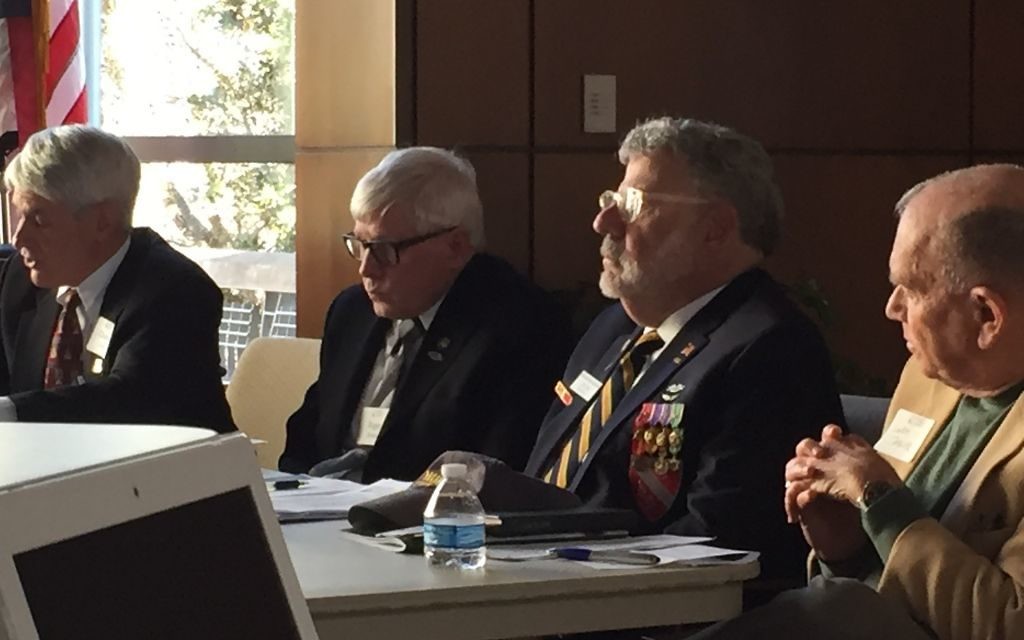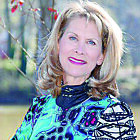Vietnam Vets Share Their Reality
A Temple Sinai panel discussion marks the 50th anniversary of the Tet Offensive.

Three men who served as military officers in Vietnam marked the 50th anniversary of the Tet Offensive by arguing that the war was winnable, despite the contrary view of a younger veteran who served as moderator.
Temple Sinai hosted the panel discussion among Vietnam veterans Cary King, Larry Taylor and Roger Soiset with moderator Charles Lutin.
After viewing a condensed version of the Tet episode of the recent Ken Burns/Lynn Novick documentary on the war, the panel participants took command.
Get The AJT Newsletter by email and never miss our top stories Free Sign Up
The Vietnam veterans agreed that the documentary was inaccurate and could be harmful if used as a teaching tool.
“This Burns piece is a disappointment based on a false premise and wrong moral equivalency assigned to both sides,” Taylor said. “The war labeled as ‘unwinnable’ was indeed winnable … as we had won three times but never exploited our success. We waited and allowed the enemy to rearm … repeatedly.”
Soiset said CBS newsman Walter Cronkite’s declaration that America was mired in a stalemate, even though he had spent only a few days abroad, could even be called fake news.
In a riveting off-the-record phone call, an angry President Lyndon Johnson blasted the president of CBS for spreading slanted opinions at such an important time.
But Lutin, who did not serve in Vietnam, thought the movie “was outstanding and, more importantly, correct. Had we acted on the military professionals’ recommendations, we would still be in Vietnam 50 years later, winning the body count and no closer to concluding the war. Our military strategy was based on attrition of the enemy with massive firepower, but the enemy could and did disappear whenever it suited them for as long as needed.”
Taylor cautioned that people can be clueless and misled by myths such as “Vietnam was reunited.”
“Vietnam was never united to begin with,” he said. “There is a wrong implication that this was a civil war. Now the North admits that they invaded the South. Even to this day, only members of the North serve in the government.”
King, an Atlanta native and graduate of Grady High, explained the sacrifices made by those who served. “I am not a politician. I was there as a soldier. I left an infant daughter at home and waited up to 45 days for any mail from my family.”
Addressing the negativity that veterans confronted back in the United States, King said a rabbi asked him, “What does it feel like to fight in an immoral war?” King was ready with a retort: “How many moral wars have you fought in?”
King said he chose to wear his uniform despite taunts of “baby killer” and is proud of his service.
Soiset, who taught second- and third-generation Vietnamese children in the United States, emphasized the importance of speaking out now. “After so many years, vets kept their experiences to themselves. In 1993 I was ‘cracked open’ to spill out this dialogue.”
One question from the audience was more of an anti-war statement. King said he respected that opinion and fought for the man’s ability to express it.
“Vietnam counted and still counts by maintaining a balance of power against China’s interests,” Taylor said, “and by allowing freedom in countries like Singapore.”
Audience member Susan Feinberg said, “I was impressed with the passion expressed by the panel about their service. When I left I thought, ‘Gee, it’s a shame that my grandchildren probably don’t know anything about the Vietnam War.’ I asked my 10th-grade granddaughter and her friend in car pool, and indeed neither did know.”
The Panel
- Cary King, major, U.S. Army — Now a lawyer in Atlanta and a Temple Sinai member, he served in Vietnam in 1967 and 1968, including the Tet Offensive, in command positions in infantry and artillery and was decorated multiple times.
- Larry Taylor, major general, U.S. Marine Corps Reserve — A graduate of Georgia Tech (AEPi) and an aviator, he flew for Air America in Laos and Vietnam in 1967 and 1968, then served in various Marine command positions. In civilian life, he was a commercial airline pilot.
- Roger Soiset, first lieutenant, U.S. Army — After graduating from The Citadel in 1968, he was on active duty in the Army and served in Vietnam in 1969 and 1970, receiving multiple decorations. He has a master’s in history and was a senior lecturer at Kennesaw State.
- Charles Lutin (moderator), lieutenant colonel, U.S. Air Force — A practicing physician in Atlanta with a deep but layman’s interest in history, he deployed to Iraq and Afghanistan during his active duty from 2007 to 2011.




comments